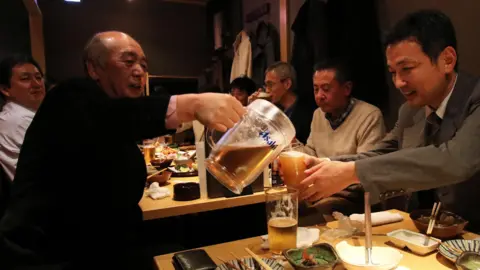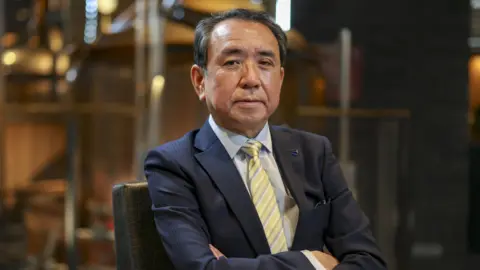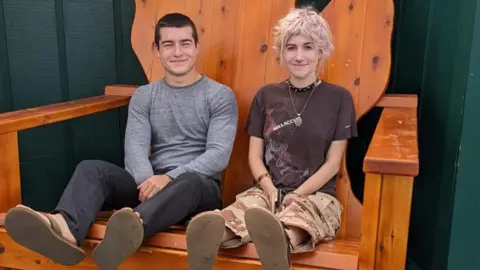Mariko Oi,Industry reporter
 Getty Pictures
Getty PicturesFor hundreds of years, alcohol has been impaired as a social lubricant. In Japan, it’s referred to as nommunication – a mixture of the Eastern commitment for drink, nomu, and communique.
The theory is that consuming alcohol creates a extra comfortable shape.
Companies have even tackled tricky problems in pubs, in lieu than convention rooms.
The overdue former chairman of then-bankrupt Japan Airways, Kazuo Inamori, explained in 2012 how he impaired beer to get his staff to unmistakable up.
However there’s now a complete pristine day that chooses not to drink as much. A couple of research in the United Kingdom, america and Australia display that folk from Gen Z are extra sober than their oldsters and grandparents.
In Japan, confronted with declining alcohol tax revenues, the government even organized a countrywide festival, named Sake Viva!, in an effort to reverse the trend in 2022.
The sober day does now not handiest impact Japan’s tax revenues, it additionally trade in a complete pristine problem for companies that build and promote alcohol.
 Getty Pictures
Getty Pictures“We have realised that younger people are increasingly choosing not to drink as much alcohol,” stated Atsushi Katsuki, the well-known government officer of Asahi Crew Holdings.
On the other hand, Japan’s largest brewer sees this as each a possibility and a chance.
“Our firm is quite unique because while the majority of our sales comes from beer and alcoholic beverages, we also have the capability to produce non-alcoholic beverages or soft drinks which gives us a competitive advantage,” he stated.
Asahi may be pushing its non-alcoholic and what it refers to as low alcohol choices – comparable to alcohol-free beer or beverages with not up to 3.5% alcohol – outdoor of its house marketplace.
“By 2030, we want to double the share of beverages with zero or low alcohol to 20% of our overall beverage sales,” he stated.
They’re already frequent in its house marketplace. Mr Katsuki stated that alcohol-free beers account for 10% of Asahi’s drinks gross sales in Japan as folk keep away from drink using.
However the Eastern marketplace is shrinking on account of an growing older crowd and falling start charges.
“Alcoholic beverages sales in Japan will continue to decline because we cannot go against the shrinking population, which means we cannot expect the Japanese market to grow massively,” he stated.
That implies Asahi’s major enlargement alternatives are out of the country, and it’s been increasing hastily in another country for 15 years. As of late, greater than part of its gross sales are generated outdoor Japan.
One main marketplace the company has but to faucet is america. The query is: can alcohol-free beer get as frequent there as it’s in Japan?
 Vincent Ball
Vincent BallVincent Ball and Samantha Benaitis are a 20-year-old couple who are living in Jacksonville, Florida. In america, regulations with regards to alcohol range in several states however the minimal hour for buying it’s 21 around the nation.
Occasion the ones above the hour of 40 of their households experience boozy nights, the Gen Zers don’t drink a lot alcohol.
“I think drinking in moderation is perfectly fine,” stated Vincent, including that he would experience having a lager nearest paintings however “not crazy parties”.
“I just find other things more enjoyable, and I don’t find drinking very important, especially in party settings.”
For Samantha, it was once a lesson learnt from ocular others consuming closely.
“I definitely was influenced by everybody around me in my life getting way too drunk or hammered, and making mistakes that impact them for a lifetime rather than just for that night.”
So rather, Samantha beverages kombucha – a fermented lightless or inexperienced tea, which is incessantly flavoured – as a result of “if you’re just drinking water, I’ve been asked many times, oh, are you really just drinking water?”
To keep away from peer power, would they drink alcohol-free beer? Their solution was once a convincing “no”.
 Layla Neal
Layla NealRequested how Asahi would take on pristine, non-drinking, customers like Samantha and Vincent, Mr Katsuki stated the company has discovered an remarkable lesson.
“We realised that we have been producing non-alcoholic beverages from the point of view of alcohol drinkers,” he stated, admitting that Asahi has now not but been in particular a success in interesting to non-drinkers.
“We’ve been collecting data in Japan by asking those who cannot or choose not to drink alcohol to understand what kind of products they want.”
In an indication of uphill combat beverages corporations face as they effort to win over Gen Z, Vincent’s more youthful sister, Josie, defined how she feels about folk getting under the influence of alcohol.
“I definitely understand people who overdrink. Would I do it myself? I hope not because people kind of tend to make a fool of themselves when they overdrink.”
If you happen to, or somebody you understand, has been suffering from problems with alcohol, the BBC Action Line has main points of organisations which could possibly aid.




